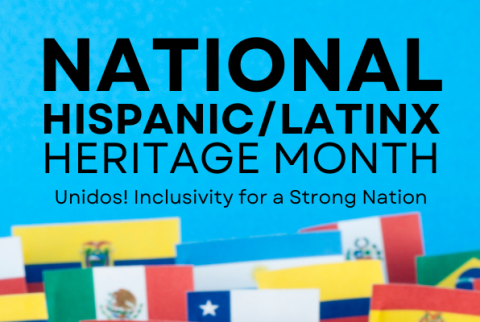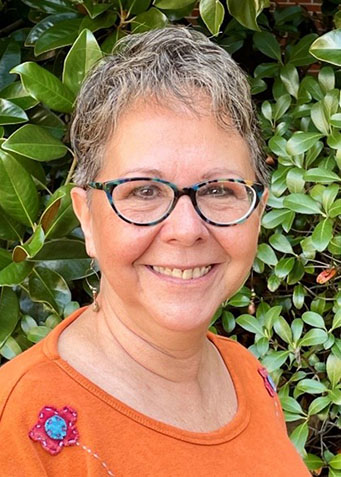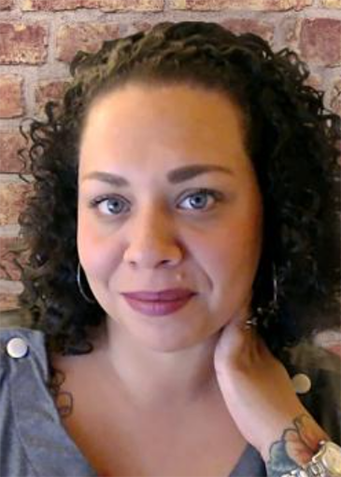Unidos! Inclusivity for a Strong Nation: Celebrating National Hispanic/Latinx Heritage Month

The College of Social Work celebrates Hispanic/Latinx Heritage Month from September 15th through October 15th. Established in 1968 by Congress, the observance honors the contributions and achievements of the diverse cultures within the Hispanic/Latinx community.
Why Start on September 15th?
Hispanic/Latinx Heritage Month begins on September 15th to acknowledge its significance as the date of independence for five countries, Coast Rica, El Salvador, Guatemala, Honduras and Nicaragua. Right after are also the independence days of Mexico (September 16) and Chile (September 18).
The college and university are celebrating Hispanic/Latinx Heritage Month with events including
- Cafecito Café
September 15 | 8:30am-12 pm and 3-5 pm
Staff member Betty Lanese shares cafecito (Cuban coffee) with the College of Social Work community. Donations are welcome that will be given to a local nonprofit serving Hispanic and Latino families.
Campus and Community Celebrations:
- CABA’s Hispanic Heritage Kickoff with VA Attorney General Jason Miyares
FSU College of Law
September 15 | 12:30 pm - Hispanic Student Union Opening Ceremony/ Screening of “Mute Fire” (Cinehassee Screening)
September 15 | 6 pm /8:30 pm - Hispanic Latinx Student Union: Mental Health Event
September 19 | 6 – 8 pm - Cultura Tallahassee Exhibit Opening: A Celebration of Hispanic Heritage (Leon County Public Library)
September 15 | 6 – 9 pm - Hispanic Latinx Student Union: We Need to Talk Event
October 3 | 8 – 10 pm - FSU Hispanic/Latinx Cultural Celebration
October 11 | 6:30 pm
Screening of Denise Soler-Cox film Project Eñye, Askew Student Life Center
The College of Social Work asked a few members of our community to share their Latinx/Hispanic heritage, family and traditions.
 Sabrina Valencia Tarazona – Student
Sabrina Valencia Tarazona – Student
What is your role at the FSU College of Social Work?
Sabrina: My role here at the FSU College of Social Work is as a senior student and undergraduate research assistant for Dr. Machelle Madsen Thompson in the Resilience and Protective Factor Initiative.
Along with Dr. Thompson and Dr. Maria Pouncey, I investigate protective factors that help Hispanic and Latino children thrive in their environment and become resilient in the face of many adverse life circumstances (ACE’s)and traumas.
What would you like to share about your heritage?
Sabrina: My family and I are Venezuelan. We came from our native country four years ago and until this day we hold onto our most precious cultural traditions. Some of them are cooking arepas every morning as our breakfast, the most famous Venezuelan dish. On the weekends, all my aunts, uncles, cousins, my parents and I used to gather at my grandparents’ house to enjoy a delicious sancocho, which my grandfather would spend all day long cooking.
Another one very dear to me is that in December, my family and I prepared in just one day 500 hallacas, the classic Venezuelan dish. This exhaustive task required every member of the family to execute a specific role depending on their age and involved the unspoken rule of not missing for any circumstance to this day given that it was the one time of the year where we would come together to make this grand Christmas gesture for the whole family. They meant more to me that any present I have ever received for Christmas.
We value our family, respect, solidarity, humbleness, and integrity. Overall, the one strength that comes to my mind when I think of my family, and which I believe extends to almost all Hispanic families, is the extent to which we are willing to make costly sacrifices for the future, safety and prosperity of other members of the family. Leaving your dream job behind, coming to a foreign country where you do not possess the support of your community, or even crossing the dangerous and deadly Darien Gap is no easy task.
What do you think is the most misunderstood about your culture?
Sabrina: Most Hispanic people that come to this country do so because they are fleeing from oppressive governments, violence, insecurity, emotional trauma, and lack of basic needs. The one thing that we carry with us, apart from some old suitcases and our memories, is the hope of obtaining quality of life and the possibility of staying here to sustain ourselves and our families back in our countries. We do not come to the USA to increase criminality, to support the global market of drug trade, or conform to unfair and degrading work. All we want is to stay together, live freely without the constant fear of being held at gunpoint, and attain our own version of success.
The theme of this year’s celebration of National Hispanic Heritage Month is “Unidos: Inclusivity for a Stronger Nation.” How do you plan to help build stronger communities and a stronger nation?
Sabrina: I plan to help build a stronger Hispanic community and a stronger nation by researching and promoting new, innovative ways in which Hispanic children can practice resilience despite experiencing deep levels of trauma in Latin countries and here in the USA. Also, I intend to give back to my Hispanic community by moving back to Miami and providing trauma-focused clinical therapy to at-risk Latino youth. We need to start addressing more the inter-generational trauma and wounds that these children carry within them if we want them to truly shine in this society.
What are you most hopeful about for the Hispanic and Latinx community?
Sabrina: One of the things I am most hopeful about for the Hispanic and Latinx community is the new political laws and reforms that some members of this country are advocating for in terms of Venezuelan and other Latin American communities to obtain Temporary Protection Status. With this status, many Hispanic people can remain in this country without immigration deporting them, obtain an employment authorization document and a social security number, travel outside the United States to reunite with our families in a safe country, and work legally to provide for their families.
What more can the social work profession do to actively deal with the issues regarding Hispanic and Latino communities?
Sabrina: Social workers are known to be passionate advocates for disadvantaged people and the ones no one wants to help. This country needs the social work profession to unite forces to advocate for pro-immigration laws and benefits. We need social workers who go out there and support immigration campaigns, work with elected officials to deal with current issues affecting the Hispanic and Latino communities, and help marginalized alien/undocumented families obtain an official legal status in the country.
Is there anything else you would like to share?
Sabrina: The happiness and hope that you, Americans, grant us Hispanics and Latinos by welcoming us into your own culture, laying before us this immense array of opportunities to seek higher education, promoting a society free of violence, helping us access health care, and mostly allowing us to know what freedom feels like, well, for me is priceless. There is a lot of work that needs to be done in this country and I think everyone knows that but believe me when I say: Buying that plane ticket to come to the United States was the best thing that ever happened to me. It got me here where I am today and for that I am grateful.
 Betty Lanese – Staff
Betty Lanese – Staff
What is your role at the FSU College of Social Work?
Betty: I am the academic support specialist for the BSW program and the college’s professional development office. One of my many responsibilities is to process the BSW applications for the fall and spring semesters. I am fortunate that I see first-hand the diversity of future BSW graduates.
What would you like to share about your heritage?
Betty: My parents, older brother, and I were born in Cuba and immigrated to the United States in 1962. My two younger brothers were born in the United States. We started our journey in Flushing, Queens, New York until we moved to Miami, Florida in 1973. My grandparents, aunts, uncles, and first cousins also immigrated from Cuba to New York and eventually to Miami. Growing up in New York, the family was able to maintain the culinary traditions because New York grocery stores carried black beans and rice, yuca, plantains, and pork. I remember one Cuban bakery offered Cuban bread, croquettes, and pastelitos. Cafecito, Cuban coffee, was always available at home.
The families would all gather on weekends, dance the twist, and then easily switch to a Cuban salsa. My parents would speak to us in Spanish, and we would answer in Spanish and English. We embraced our new way of life while we held on to our strong family convictions Spanish language, food, and music. When we moved to Miami, it was easier to reconnect to the Cuban culture because of the large Cuban population.
What do you think is the most misunderstood about your culture
Betty: One of the misconceptions of the Cuban culture is that they are politically aligned with other Hispanic cultures. While other Hispanic cultures may tend to vote more moderate to left, Cuban Americans tend to be more conservative and therefore vote republican. This is due to the failed Bay of Pigs invasion under the Kennedy administration and politicians appealing to them with a strong anti-communism message. Most people think Cuban Americans are overwhelmingly conservative, they are not. Cuban liberals are not pro-communism or socialists.
The theme of this year’s celebration of National Hispanic Heritage Month is “Unidos: Inclusivity for a Stronger Nation.” How do you plan to help build stronger communities and a stronger nation?
Betty: I hope to be more open about my heritage and culture in Tallahassee and Florida State University. Many people do not know where I was born, and I hope to share the stories of my and my family’s experiences as a Cuban in New York, Miam, and Tallahassee.
What are you most hopeful about for the Hispanic and Latinx community?
Betty: I hope that we not only cease to become targets of racism but that we can eliminate racism within our culture as well.
What more can the social work profession do to actively deal with the issues regarding Hispanic and Latino communities?
Betty: Cubans are a proud people. It has been my experience that they do not speak to those outside the family about issues or concerns. It could be because they are embarrassed, they feel they are weak and the family knows better than a stranger. They suffer abuse in silence. And then there is the language barrier and cultural differences. I believe the social work profession may want to engage with members of different cultural communities with culturally minded social workers.
Is there anything else you would like to share?
Betty: Never forget your roots!
 Kristina Finch – Institute Staff
Kristina Finch – Institute Staff
What is your role at the FSU College of Social Work?
Kristina: I serve as the director of Professional Development at the Florida Institute for Child Welfare.
What would you like to share about your heritage?
Kristina: I am a first generation Colombian American. More specifically, my family is from Barranquilla, Colombia. It’s a beautiful coastal city that backs up to the Caribbean Sea. Barranquilla is a multicultural melting pot made up of people from Indigenous Native Tribes, European, Arab, Jewish, and African ancestry. This is something that is very much celebrated in Barranquilla as can be evidenced by our Cumbia and Vallenato music, our food – empanadas, sancocho, and arroz de coco, and our famous Carnaval celebrations that focus on keeping the traditions of both the Native Indigenous people and African slaves brought to Barranquilla alive.
What do you think is the most misunderstood about your culture?
Kristina: This is two-fold, that we (Hispanics) are alike, have the same customs, like the same foods, listen to the same music, etcetera. Also, I truly believe people that are unfamiliar with Barranquilla, when they hear that I am from Colombia, make references to those portrayals of Colombians from what they have learned from negative media attention and the film industry. They see the drug cartels, the violence, the negativity. They don’t dig in deep enough to examine the pure depth and beauty that is the diverse Colombian culture, especially that of Barranquilla. In Barranquilla we celebrate multiculturalism, we honor it to ensure customs and traditions are not lost through the generations.
The theme of this year’s celebration of National Hispanic Heritage Month is “Unidos: Inclusivity for a Stronger Nation.” How do you plan to help build stronger communities and a stronger nation?
Kristina: I think it is important that I keep the culture of my family’s homeland alive through my children. I focus on teaching them the language, culture and traditions. I want them to understand that they can both live in America, be American while also holding onto their cultural roots. We don’t need to let go of one culture to assimilate to another. Why must we give up our diversity to be considered a “proud American?” America was built on multiculturalism, and it should be celebrated and supported.
What are you most hopeful about for the Hispanic and Latinx community?
Kristina: I am hopeful that my generation has the commitment, voice, and ability to educate people publicly about the history of Hispanic culture and its diversity. We live in a time where information sharing is at its height, let’s use it to ensure our voice is heard, our images are shared, and to celebrate our diversity, beauty, and contributions to history and this country.
What more can the social work profession do to actively deal with the issues regarding Hispanic and Latino communities?
Kristina: I think it focuses around coming to us. Asking us about us. Finding out who we truly are and how diverse each and every Hispanic culture is. I think you will find that we are happy to share who we are with you and that it will inform the specific needs of each Hispanic community which can be rather independent of each other.
Is there anything else you would like to share?
Kristina: It’s ColOmbia, not Columbia.

